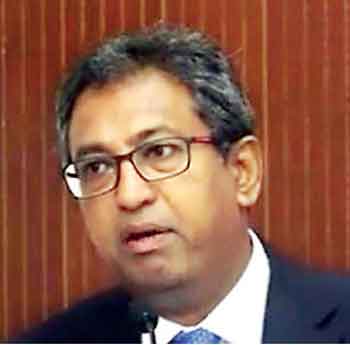Saturday Feb 21, 2026
Saturday Feb 21, 2026
Monday, 9 June 2025 01:40 - - {{hitsCtrl.values.hits}}
 |
| Dr. Harsha de Silva |
Economist and Parliamentarian Dr. Harsha de Silva recently criticised the Ceylon Electricity Board’s (CEB) proposed electricity tariff revision for the latter half of 2025, arguing that the financial calculations presented by the utility are fundamentally flawed and violate principles of fairness and transparency.
Speaking at the Public Utilities Commission of Sri Lanka’s (PUCSL) public consultation held on 3 June at the Bandaranaike Memorial International Conference Hall (BMICH), he dismantled key elements of the CEB’s financial projections and accounting methodology.
One of the focal points to his argument was the CEB’s reported profit of Rs. 144 billion in 2024, a figure he said is misleading due to the inclusion of a Rs. 62 billion ‘clawback’—a term many interpret as ‘advance payments’ collected from electricity users.
“A total of Rs. 51 billion of this clawback is attributed to the January-July six-month period, with Rs. 25.5 billion specifically tied to the first quarter. If this clawback is properly accounted for, the CEB would actually show a profit of about Rs. 7 billion in the first quarter, invalidating the projected Rs. 42.2 billion loss for the second half of 2025,” he argued.
Dr. de Silva also claimed that the CEB has altered revenue figures mid-year.
“The allowed revenue for both transmission and distribution has been changed after being approved for the full year. It is a move that is not permissible under established practices,” he said.
He referenced expert reports that criticise these mid-year alterations and stressed that revenue allocations must remain consistent within the annual framework unless new approvals are obtained through proper channels.
Dr. de Silva, who is also the Chairman of the Committee on Public Finance (CoPF), raised questions about the CEB’s reported finance costs, particularly a Rs. 14 billion figure, which includes Rs. 5.2 billion attributed to the impact of debt restructuring.
“This portion of the cost derived from the legacy debt should not be included in the immediate tariff calculations. In cases where new power plants are developed, associated capacity costs are typically treated separately in tariff models. Thus, including this legacy debt as a cost burden for current and future customers violates the principles of cost causation and fairness,” he pointed out.
He suggested that this move parallels previous administration missteps that led to unsustainable public borrowing, which was recently discussed in Parliament in the context of a Rs. 20 trillion national loss.
Dr. de Silva stressed that passing unjustified financial burdens onto electricity users through manipulated tariff structures is unacceptable.
He also pointed to the technical but critical flaw of the CEB’s proposed method for recovering losses through a tariff adjustment.
According to him, the CEB seeks to recover Rs. 8.3 billion in losses from first quarter 2025 by adjusting the tariffs for July-December or the second half of 2025. This violates the established methodology for tariff adjustment, which is based on the principle of comparing corresponding timeframes—quarter-to-quarter (Q to Q) or half-year-to-half-year (H to H).
“Mixing timelines, such as comparing 2025 first quarter losses to 2025 second half revenue, not only misaligns the data, but also distorts the tariff calculation process. It is unacceptable,” he asserted.
Noting that the tariff methodology proposed by the CEB is fundamentally flawed and requires revision, Dr. de Silva called on the electricity regulator—the PUCSL—to reconcile these forecasting and accounting discrepancies using a consistent and fair timeline.
“If a quarterly model is preferred, then tariff adjustments must be standardised accordingly,” he said.